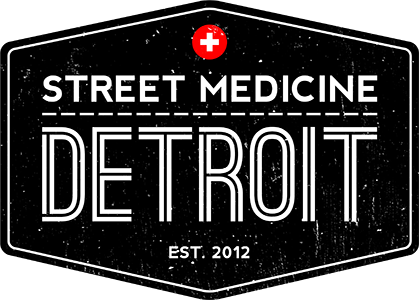In late April of this year, I went on my first “street run” with Street Medicine Detroit (SMD). As a medical student, it’s nice to get away from the books and learn outside the classroom. Volunteering is a great way to complement my studies and help out in the community. Aside from gaining medical knowledge, volunteering with SMD provides insight on the dynamic of the doctor-patient relationship. On my first street run, I experienced firsthand how trust and respect inform this important relationship.
The street run took place at Manna Meal, a soup kitchen in Detroit’s Corktown neighborhood. As the SMD team walked through the kitchen and sitting area to the backroom, where we were to set up the clinic for the day, I was excited yet somewhat anxious. I recall two immediate concerns entering my mind: did I know enough medicine to assist these patients and even if I did know how to help, could I gain their trust and respect? I had spoken with individuals experiencing homelessness in the past, and some of them shared with me feelings of alienation from healthcare professionals. Would I be able to work past this divide? I quickly learned that my first concern was not was not an issue; I would be duly supported by Nurse Practitioner Dean Carpenter of the Neighborhood Service Organization (NSO) who assists students in diagnosis and treatment. Still, my second concern loomed.
We set up the clinic in a room at the back of the shelter and divided into teams of students. After setting up equipment, we met our first patient. He was a young man experiencing homelessness who presented with a rash above his right wrist. During the medical interview, he told us that he had been diagnosed with paranoid schizophrenia. He went on to inform us of his general distaste for medical care, including his aversion to sharp items like needles. He explained that he would have gone to the emergency department (ED), but he had prior bad experiences there. He preferred to be in a familiar environment, such as Manna Meal soup kitchen. This initial interaction bolstered my concern that I might not be able to connect with this patient. I knew we would have to work to earn his trust.
We worked slowly through the patient interview, asking about his past medical history and his social history in an effort to understand our patient and find out how we could help him. As the patient interview continued he seemed to slowly become more comfortable with us and began discussing very personal issues. We listened attentively and did our best to respond with respect and kindness. Thankfully, the patient load for the day was not over-burdensome, which gave us the opportunity to listen to the patient without interruption. He had lived a difficult life and the least we could do was lend an ear. After completing the interview we consulted with Nurse Practitioner Dean Carpenter. A diagnosis of Methicillin-resistant Staphylococcus aureus (MRSA) was reached. We offered the patient potential drugs for the bacterial infection, but he informed us that he was allergic to one of the drugs (initially the patient had said that he had no known allergies to any medications). We began to discuss potential treatment options when, to my surprise, the patient stated that he wished to go to the ED for further care. Because of his prior statements and because I wanted to ensure he would actually seek further treatment, I asked him whether he felt comfortable going to the emergency department. He responded by stating that it was the proper thing to do in this scenario and that his time with us made him feel more comfortable interacting with healthcare providers. He thanked us and left for the ED.
I was initially disappointed that we weren’t able to provide direct care to this patient. However, after some reflection, I realized that we did many positive things for this gentleman. I’d like to think that the respect we gave him provided him with a positive medical experience and helped to motivate him to seek further care from the ED. This was a stark reminder that providing valuable healthcare does not always necessitate prescribing drugs and preforming procedures. Ensuring that patients are well respected and realize that healthcare providers are looking out for their best interests goes a long way towards helping patients, especially when it comes to patients in vulnerable situations.
Andrew Wayne, MS2, Communications Director for SMD

